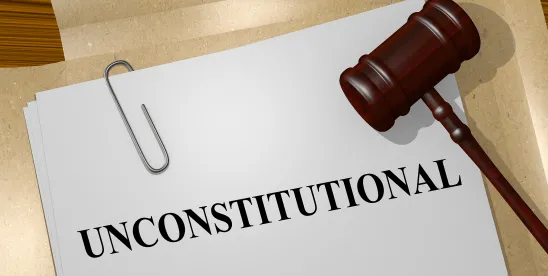Yesterday, a federal district court in Kentucky issued a ruling in Tennessee v. Cardona, finding that the 2024 Title IX regulations are unconstitutional and violated the Administrative Procedures Act (APA) by being “arbitrary and capricious.” The court ordered vacatur, which “takes the unlawful agency action ‘off the books. . .’” and prevents application of the regulations “to all who would otherwise be subject to its operation.” (1)
The memorandum opinion of the court found that “expanding the meaning of ‘on the basis of sex’ to include ‘gender identity’ turns Title IX on its head.” (2) Further, the court determined that the First Amendment was violated by requiring Title IX recipients, specifically teachers, to use names and pronouns associated with a student’s asserted gender identity. (3) Furthermore, the court found that the regulations are overly broad and/or vague that schools have no way of predicting what conduct might violate the law. (4) For example, the court cited to the new regulation’s prohibition of “[u]nwelcome sex-based conduct that, based on the totality of circumstances, is subjectively and objectively offensive . . (5) As discussed in the training offered by SMGG on this topic, this portion of the regulation made determination of Title IX violations completely on a case-by-case basis, with no true guide as to offensive conduct. Due to the constitutional infirmity of the regulations, the court also found that the provisions violate the Spending Clause of the United States Constitution. (6)
In determining the appropriate remedy, the court found that all aspects of the new regulations were tainted with the provisions that the court deemed invalid, requiring the entirety of the regulations to be “jettison[ed].” (7) The court held that the “normal remedy” is vacatur when the challenged action of an administrative agency violates the law. (8) The court also granted plaintiffs’ declaratory relief, and characterized it as “Plaintiff States, their political subdivisions, and their recipient schools need not comply with the Rule to receive federal funding.” (9)
What this Means for Your School
The nationwide vacatur of the 2024 Title IX final rule means that the 2020 Title IX final rule as well as the prior Title IX regulations are in effect. It is anticipated that the Department of Education may issue guidance in the aftermath of yesterday’s ruling, which SMGG education attorneys will monitor.
(1) See, State of Tennessee v. Cardona, No., 2:24-00072 (Jan. 9, 2025), p. 13 (citations omitted).
(2) Opinion, p. 7.
(3) Id. at p. 8.
(4) Id.
(5) 34 C.F.R. §106.2 (emphasis added).
(6) Opinion, p. 10.
(7) Id. at p. 12.
(8) Id.
(9) Id. at p. 15.




 />i
/>i

